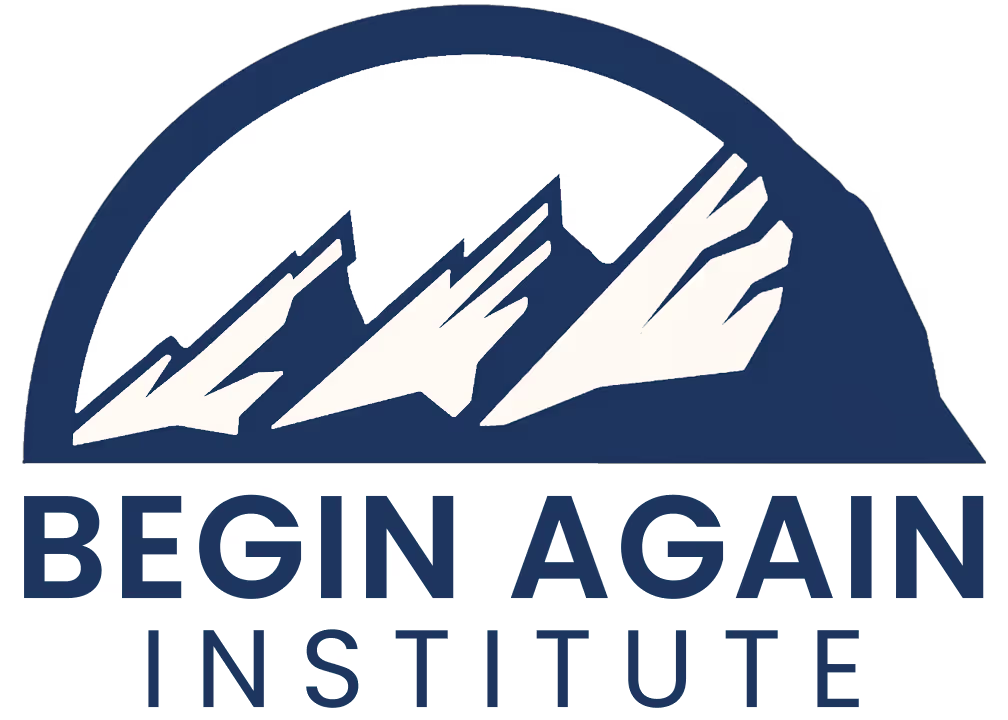A Comprehensive Guide to Sex Addiction Rehab


Sex addiction can be consuming and debilitating. You may feel like you’re trapped underwater and can’t reach the surface. It can significantly impact your mental health, relationships, and daily life. Millions of Americans suffer in silence. But there is hope for healing.
If sex addiction has overtaken your life, there’s no shame in seeking rehabilitation. The first step is recognizing your addiction and being honest about your struggles. If you are willing to accept treatment, you can find healing.
At Begin Again Institute, we’ve successfully treated hundreds of men experiencing sex addiction through our 14-Day Men’s Intensive and our Boulder Recovery 14-Day Christian Men’s Intensive. Our nonjudgmental approach to sex addiction rehab allows clients to understand the “why” behind their behaviors and find the tools to heal, rebuild, and live a life of purpose and authenticity.
Below, we’ll cover the process of sex addiction rehab, treatment options, maintaining recovery, and how to find the right program for you.
Understanding Sex Addiction
Sex addiction is an uncontrollable, compulsive need to focus on sexual activities that cause distress to your life. You may experience a craving similar to other addictions like drugs or alcohol. It causes strain on daily activities, health, relationships, jobs, or other regular aspects of life.
Sexual desire is normal and healthy, but it becomes a problem when it takes over your life and harms you and those around you. So how does a natural desire turn into a crippling addiction? It doesn’t happen overnight.
Trauma causes sex addiction, typically through experiences earlier in life. If you weren’t able to process or cope with the trauma, you might turn to temporary vices, like sex, to deal with the negative emotions. Sex addiction is an intimacy disorder. It stems from the fear of feeling close to another person.
When you engage in sexual activities, your brain releases the neurotransmitter dopamine, a chemical that causes pleasure. Similar to drug addiction, sex triggers your brain’s reward system. Then, you begin to experience a craving for this reward. Your brain starts associating this feeling with power over your own life and pleasure you can’t get elsewhere. But as you train your brain, your need for sex gets out of your control.
Complications and Consequences
If sexual activities have become the central focus of your life, it will have consequences.
Sex addiction is often time-consuming. The desire to satisfy these urges may take priority over relationships, school, or work, causing damage to your life. Spending time fueling the addiction may include engaging in sex, excessively watching porn, seeking out sexual partners, or masturbating.
People experiencing sex addiction may neglect time spent with loved ones to feed their addiction. Due to the shame and stigma surrounding sex addiction, you may be compelled to lie and attempt to hide the problem, causing further rifts in your relationships.
Sex addiction can also cause work and financial strife. You may find your work performance suffering due to constantly thinking about sex. Financial issues and debt can stem from excessively spending money on sexual services and pornography. You may encounter legal trouble if you engage in unlawful sexual behavior.
Sex addiction also can impact your health. When continuously seeking a dopamine high, your brain builds a tolerance. The activities that satisfied you before no longer give you the same pleasure. You may increase risky sexual behavior to satisfy your needs, which could result in health problems such as STIs. You may even neglect your health or hygiene due to sex addiction. Over time, this cycle can make you feel trapped.
You have probably felt that your mental and emotional health suffered due to sex addiction. It can cause feelings of guilt, shame, and low self-esteem. You may also develop co-occurring mental health disorders such as depression or anxiety.
Treatment Options
Recovering from sex addiction requires addressing the root of the problem, not just treating the symptoms. There are various treatment options that can help you manage sexual addiction, regain control of your impulses, and live a life of lasting recovery.
Treatment options include:
- Psychotherapy. Cognitive Behavioral Therapy (CBT) allows you to identify triggers and teaches you how to alter your behavior. The treatment encourages replacing negative sexual behaviors with healthy thought patterns toward sex. It also helps introduce healthy, non-sexual activities that you can default to during times of stress or boredom. CBT is effective in treating sex addiction, including de-catastrophizing sexual thoughts and activities.
- In-Patient Treatment. An intensive treatment program like the ones offered through Begin Again Institute and Boulder Recovery allows you to disconnect from daily life and focus on healing. You’ll have access to mental health professionals who help uncover the root of the sex addiction and offer coping mechanisms. It also allows you to receive personalized treatment to fit your needs.
- Support Groups. Sex addiction can feel incredibly isolating, but millions of Americans experience it every day. Finding a supportive community can help you manage your addiction by providing accountability, decreasing shame and stigma, and finding support in your healing journey.
With any kind of treatment, you get out of it what you put in, said Matt Wenger, Clinical Director at Begin Again Institute and Boulder Recovery.
“You have to be committed,” he said. “The outcomes depend on what you want when you come in. You’re going to get out of it exactly what you want to get out of it.”
Finding the Right Program
If you choose to enter a recovery program, research different treatment centers to find what best fits your needs. A program that treats the root of the issue, not just the symptoms, is more likely to result in long-lasting recovery.
Seek a program that offers a certified sex addiction therapist (CSAT). These mental health professionals have highly specialized knowledge to help people experiencing sex addiction. A CSAT uses trauma-informed treatments to uncover the root causes of the addiction and help you deal with them.
If you are looking for a program that makes recovery feasible for your schedule and your life, consider a shorter intensive, like those offered through Begin Again Institute. You will get access to trauma-focused therapy, support groups, and 24/7 care that can help you jumpstart your recovery.
“An intensive program can bring new levels of healing,” Matt said. “It also can give you a running start with levels of healing that you can achieve down the road.”
You may be seeking a higher level of care with an extended curriculum. A month-long program can offer the same specialized care as an intensive but with more time to uncover early developmental trauma, discover replacement behaviors, and establish healthy habits. Some longer-term programs may also offer care for substance use or other mental health disorders coupled with sex addiction.
Entering a treatment program is a big step, but it’s a brave step toward lasting recovery. Remember that healing requires honesty and vulnerability. Choose a treatment program that has a non-judgmental philosophy, so you can feel safe and cared for in your recovery.
Maintaining Recovery and Preventing Relapse
Overcoming sex addiction is not easy. By enacting a recovery maintenance plan, you can avoid triggers and prevent relapse.
Be prepared for sex addiction withdrawals. If you’ve ever tried to stop before, you’ve experienced this.
Withdrawal symptoms can include:
- Insomnia
- Lack of appetite
- Anxiety
- Depression
- Nausea, fever, chills
- Night sweats
- Mood swings
- Low libido
- Genital sensitivity
- Brain fog
Recovery maintenance allows you to focus on sustaining long-lasting healing. It’s not a one-time solution but a life-long practice. It’s a safety net you can default to in times of stress and potential relapse.
Strategies for recovery maintenance include:
- Avoiding triggers
- Creating an action plan for encountering triggers
- Regularly seeing a CSAT
- Attending support groups
- Finding positive replacement activities
- Connecting with treatment program alumni
- Sharing your struggles with trusted loved ones
Once you have completed a treatment program, commit to the lifestyle changes and coping mechanisms you have instituted to sustain your recovery. Sex addiction doesn’t go away, but with honesty and discipline, you can find healing.
Recovery is a life-long process, Matt said.
“It changes you and who you are,” he said. “Even if you relapse, it’s a whole new process to move into recovery again because you’re not the same person you were when the addiction began initially.”
Step Into Your Authentic Life
The journey to lasting recovery can start today. It is possible to regain control of your life and rebuild relationships. Entering sex addiction rehab is a courageous step that will change your life for the better. There is help available. You just have to ask for it.
At Begin Again Institute, we’re committed to trauma-informed and nonjudgmental treatment. It’s our promise to create a safe and compassionate environment for your journey to overcoming sexual addiction. Give us a call today to step into your authentic life. It’s been waiting for you.
{{embed-7198}}
Test Intensive Date
We get right to work, so you can get back to life.
“Begin again helped me jumpstart my healing. It’s like
a years worth of therapy in one trip.”


